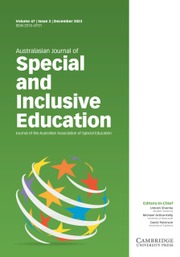Article contents
School-Based Abuse Prevention Programs for Children With Disabilities: A Qualitative Study of Components and Methods
Published online by Cambridge University Press: 13 September 2021
Abstract
Children with communicative and/or intellectual disabilities are disproportionally affected by abuse when compared to their typically developing peers. In this study, we investigate the key components and teaching methods for abuse prevention programs for use in special schools. The views of parents of children with disabilities were obtained via semistructured individual interviews (n = 6), and the views of special education teachers (n = 7) and practitioners who work with child victims with disabilities (n = 5) via focus groups. Results were coded using thematic analysis and are reported using the behavioural ecological model. Results indicate that children’s rights and empowerment were seen as key components. Videos and role-play were reported as effective interactive teaching methods. Using augmentative and alternative communication strategies, such as pictorial support and manual signs, were thought to increase children’s understanding and participation. We conclude that teacher involvement in school-based abuse prevention is essential to meet the needs of children with disabilities.
Keywords
Information
- Type
- Original Articles
- Information
- Australasian Journal of Special and Inclusive Education , Volume 45 , Issue 2 , December 2021 , pp. 252 - 267
- Copyright
- © The Author(s), 2021. Published by Cambridge University Press
Footnotes
This manuscript was accepted under the Editorship of Umesh Sharma.
References
- 8
- Cited by

